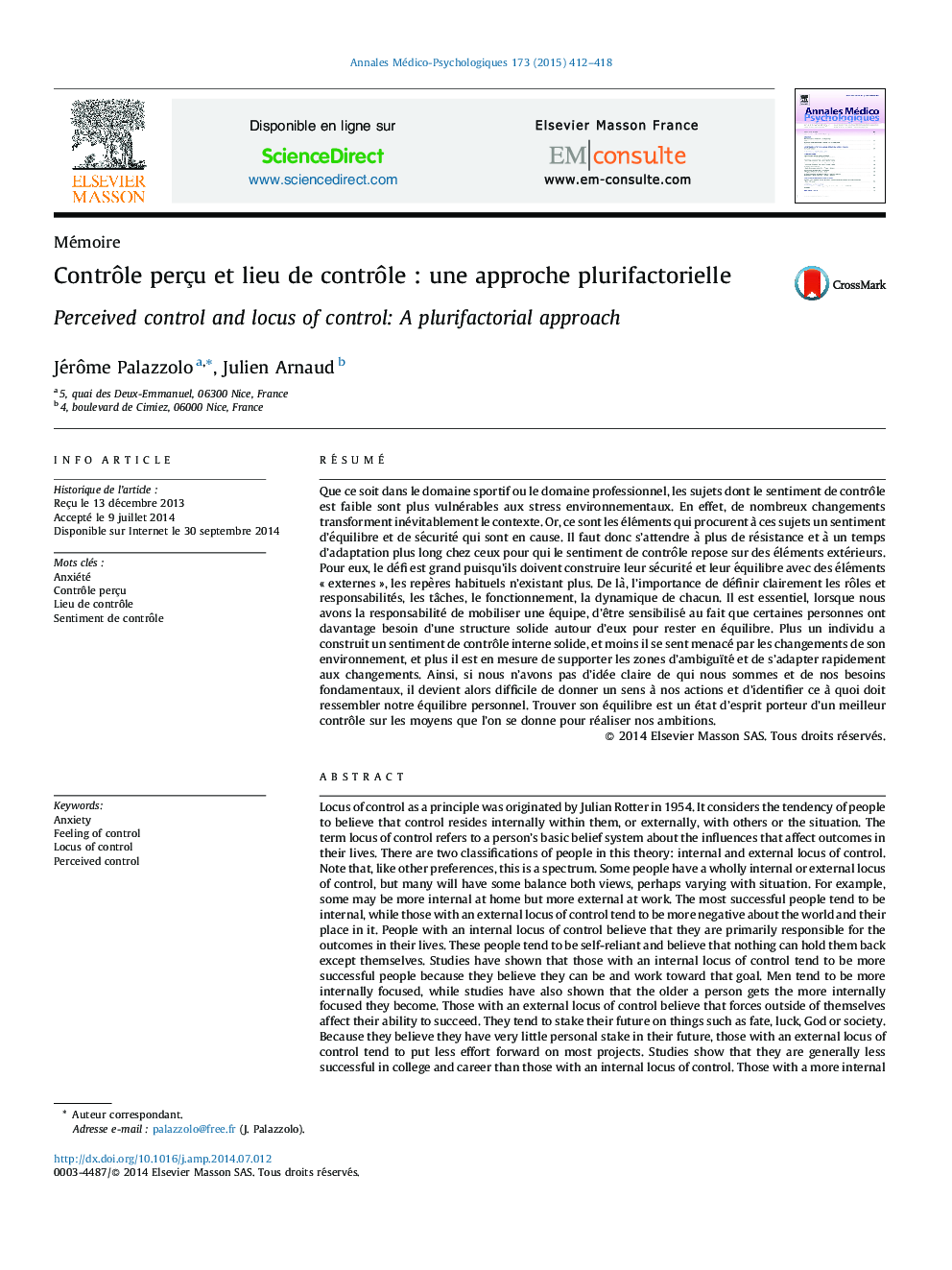| کد مقاله | کد نشریه | سال انتشار | مقاله انگلیسی | نسخه تمام متن |
|---|---|---|---|---|
| 312283 | 534203 | 2015 | 7 صفحه PDF | دانلود رایگان |

RésuméQue ce soit dans le domaine sportif ou le domaine professionnel, les sujets dont le sentiment de contrôle est faible sont plus vulnérables aux stress environnementaux. En effet, de nombreux changements transforment inévitablement le contexte. Or, ce sont les éléments qui procurent à ces sujets un sentiment d’équilibre et de sécurité qui sont en cause. Il faut donc s’attendre à plus de résistance et à un temps d’adaptation plus long chez ceux pour qui le sentiment de contrôle repose sur des éléments extérieurs. Pour eux, le défi est grand puisqu’ils doivent construire leur sécurité et leur équilibre avec des éléments « externes », les repères habituels n’existant plus. De là, l’importance de définir clairement les rôles et responsabilités, les tâches, le fonctionnement, la dynamique de chacun. Il est essentiel, lorsque nous avons la responsabilité de mobiliser une équipe, d’être sensibilisé au fait que certaines personnes ont davantage besoin d’une structure solide autour d’eux pour rester en équilibre. Plus un individu a construit un sentiment de contrôle interne solide, et moins il se sent menacé par les changements de son environnement, et plus il est en mesure de supporter les zones d’ambiguïté et de s’adapter rapidement aux changements. Ainsi, si nous n’avons pas d’idée claire de qui nous sommes et de nos besoins fondamentaux, il devient alors difficile de donner un sens à nos actions et d’identifier ce à quoi doit ressembler notre équilibre personnel. Trouver son équilibre est un état d’esprit porteur d’un meilleur contrôle sur les moyens que l’on se donne pour réaliser nos ambitions.
Locus of control as a principle was originated by Julian Rotter in 1954. It considers the tendency of people to believe that control resides internally within them, or externally, with others or the situation. The term locus of control refers to a person's basic belief system about the influences that affect outcomes in their lives. There are two classifications of people in this theory: internal and external locus of control. Note that, like other preferences, this is a spectrum. Some people have a wholly internal or external locus of control, but many will have some balance both views, perhaps varying with situation. For example, some may be more internal at home but more external at work. The most successful people tend to be internal, while those with an external locus of control tend to be more negative about the world and their place in it. People with an internal locus of control believe that they are primarily responsible for the outcomes in their lives. These people tend to be self-reliant and believe that nothing can hold them back except themselves. Studies have shown that those with an internal locus of control tend to be more successful people because they believe they can be and work toward that goal. Men tend to be more internally focused, while studies have also shown that the older a person gets the more internally focused they become. Those with an external locus of control believe that forces outside of themselves affect their ability to succeed. They tend to stake their future on things such as fate, luck, God or society. Because they believe they have very little personal stake in their future, those with an external locus of control tend to put less effort forward on most projects. Studies show that they are generally less successful in college and career than those with an internal locus of control. Those with a more internal locus of control tend to be happier and experience less stress. They also enjoy better health (likely because they experience less of the damaging chronic stress that can come from feeling powerless), and are more satisfied with life in general. Perhaps, not surprisingly, those with an external locus of control are more susceptible to depression as well as other health problems, and tend to keep themselves in situations where they experience additional stress, feeling powerless to change their own circumstances which adds even more stress to their lives. Indeed, this can become a vicious cycle. It is often believed that those with an external locus of control are destined to be unhappy. There is no guarantee that those with an external locus of control are unable to be successful nor that they are unhappy. Many with this focus are able to see life as a series of fated events that they can just as easily fall on the good side of. Some are able to find freedom in this concept and live happy lives in the process.
Journal: Annales Médico-psychologiques, revue psychiatrique - Volume 173, Issue 5, June 2015, Pages 412–418